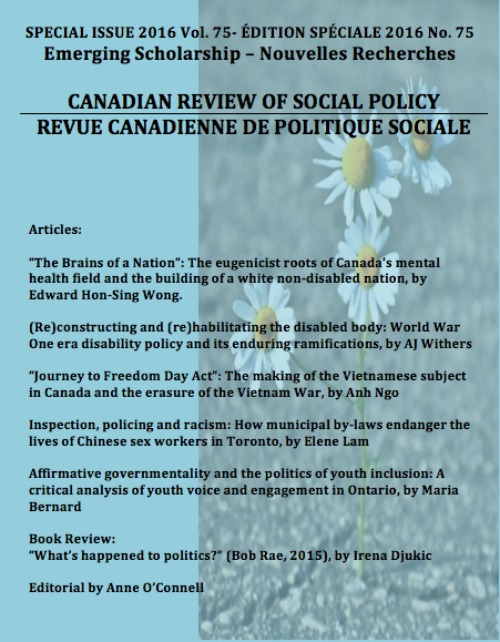“The brains of a nation”: The eugenicist roots of Canada’s mental health field and the building of a white non-disabled nation
Mots-clés :
mental hygiene, Canadian nationhood, racism, immigration, eugenicsRésumé
This paper examines the literature published by the Canadian National Committee for Mental Hygiene (CNCMH), a precursor to the Canadian Mental Health Association (CMHA), from 1918-1921, and its connection to eugenicist social policies. Specifically, this study involves a critical discourse analysis of the Canadian Journal of Mental Hygiene (CJMH) published by the CNCMH, which illustrates how the roots of Canada's mental health field are linked to a nation-building project deeply intertwined with eugenicist notions of race and disability. Foundation myths that reinforce the Canadian nation were also imbued in the literature, including: Canadian identity as linked to white non-disability, Canada as tabula rasa, and eugenicist fears of the ‘over-population’ of ‘undesirables’. On the basis of these foundation myths, the CNCMH considered mental hygiene discourse and practice as a means to further Canada as a white nondisabled nation. The desire to further the Canadian nation in this manner led to the promotion of eugenicist social policies. Many of these policies - especially, immigration controls - were put into place by the Canadian government and remain to this day.
“ Les cerveaux d'une nation”: Les racines eugéniques du domaine de la sante mentale et la construction d'une nation blanche et non-handicapée.
Résumé
Cet article examine des documents publiés entre 1918-1921 par le comité national d’hygiène mentale du Canada (CNHMC), organisation précurseur de l'association canadienne pour la santé mentale (ACSM). Il examine surtout sa connexion avec des politiques sociales eugéniques. L’article déploie une analyse critique du Canadian Journal of Mental Hygiene (CJMH), publié par le CNHMC, qui démontre que les origines du domaine de la santé mentale au Canada est liée au projet de nation canadienne, lui-même profondément entrelacées de notions eugéniques de race et de handicap. Des mythes fondateurs qui réifient la nation canadienne imprègnent également ces documents: l'identité canadienne définie comme blanche et non-handicapée, le Canada existant en tant que tabula rasa, et les craintes que la surpopulation des « indésirables » nous menace. Se reposant sur ces mythes, le CNHMC considérait que les discours et les pratiques sur l'hygiène mentale étaient des moyens de promouvoir une nation canadienne blanche et non-handicapée. Promouvoir une telle nation canadienne a mené a soutenir des politiques sociales eugéniques. Plusieurs de ces politiques- surtout sur l'immigration et le contrôle policier- ont été mise en place par le gouvernement canadien alors, et demeure en place aujourd'hui.
Mots clefs: hygiène mentale; identité national canadienne; racisme; immigration; eugénismeTéléchargements
Publié-e
Comment citer
Numéro
Rubrique
Licence
1-The author guarantees that the manuscript is an original work not published elsewhere in print or electronically in whole or in part, except in abstract form, that the author has the full power to make this contribution, and that the manuscript contains no matter libelous or otherwise unlawful or which invades the right of privacy or which infringes any proprietary right.
2-The author guarantees that the manuscript has not been previously published in print or electronically and that if the manuscript contains any tables, figures or images fully reproduced or closely adapted from previously published material, the author must obtain the necessary permission from the author/publisher holding the original copyright prior to publication in CRSP. The author may be required to produce evidence of permission granted to CRSP’s editors.
3-As a condition of publication in CRSP, the author assigns all copyright to CRSP, including but not limited to the right to publish, republish, and otherwise distribute this manuscript in print, electronic, or other formats. As CRSP is a non-profit interdisciplinary scholarly journal, the author will receive no royalty or other monetary compensation for the assignment set forth in this agreement.
For the purpose of full disclosure, CRSP will not normally use the content provided by the author in a commercial venture, but for the purpose of disseminating the author’s content to as many readers as possible. For distribution, third parties engaging in commercial activities may be contracted to distribute the content globally, and such parties may make a profit out of the author’s content in their normal course of business. CRSP will not pay the author or reimburse the author in any form based on such commercial activities because the conduct of such commercial activities is outside the control of CRSP.
Any future reference to or use of this published material by the authors must acknowledge CRSP as the original place of publication.
PERMISSION REQUEST/ARCHIVING
Permission is given to author(s) receiving funding via Tri-Council Agencies, the Canadian Institutes of Health Research (CIHR), the Natural Sciences and Engineering Research Council of Canada (NSERC) and the Social Sciences and Humanities Research Council (SSHRC), to make their publications freely available in an Open Access repository within the stated deadline by the Tri-Council Agencies (12 months following publication). Archiving of publication must be a manuscript copy bearing none of the CRSP headers, footers or any other distinguishing marks. No links to the article on the CRSP website is permitted.
Permission requests from third parties to reproduce articles in part or full in academic/educational publications can be directed to the managing editor of CRSP, and will not be unreasonably denied.

